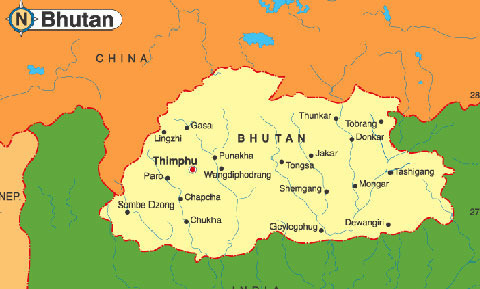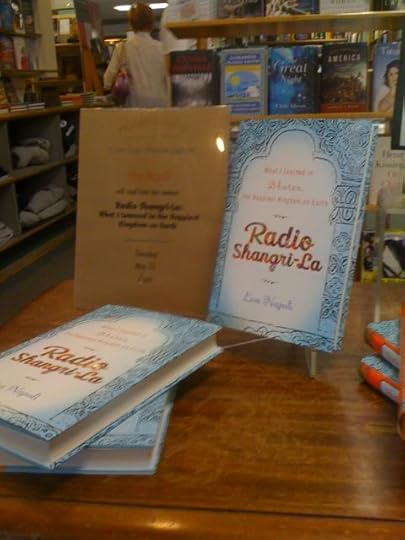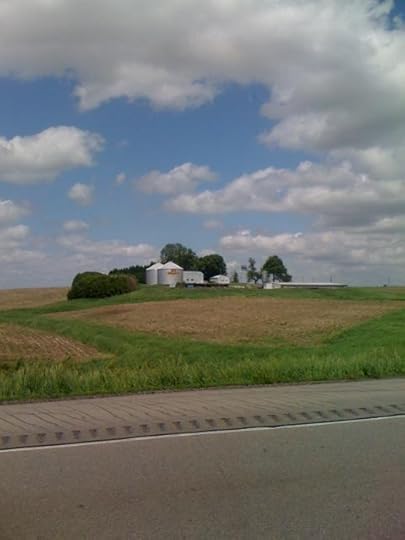Lisa Napoli's Blog, page 48
June 1, 2011
Happiness is a choice
From a blog called Brain Pickings: Thxthxthx: The Art of Finding Happiness in Everyday Gratitude
(Thanks for sending, Rafat!)








May 31, 2011
North Korea's happiness index
Prairie Lights Books in #IowaCity
Travel Fun on #KOTO radio
Maribeth Clemente writes:
Just a reminder:
My next Travel Fun airs Tuesday, May 31 at 6:30 p.m. (mountain) in Telluride, Colorado and within the outlying region. You can also tune in on the Internet at www.KOTO.org at the time of the show. Lisa Napoli , author of "Radio Shangri-La: What I learned in Bhutan, the Happiest Kingdom on Earth," will be my guest on that program.
You may want to post to your facebook page.
Hope to get the podcast up soon.
Thx,
Maribeth








Approaching Iowa City
May 29, 2011
The man who scooped the GNH story/Kuensel
28 May, 2011 – John Elliot is one of three foreign journalists to have interviewed the fourth Druk Gyalpo. The interview, which took place in 1987, resulted in an article that is believed to be the first news report on GNH. John was recently in the country for the Mountain Echoes literary festival. Currently, he is the India contributor for Fortune magazine.
As a journalist, you've had the rare privilege of interviewing the fourth Druk Gyalpo. What did you talk about?
I didn't realise until I came back to Bhutan a few days ago for the first time since 1987, that the interview that I had was so unusual. I knew at the time that I had a scoop. I knew that I had a very rare privilege of an interview as a foreign correspondent based in Delhi with the fourth King. But I didn't realise at the time how few interviews His Majesty had given during his reign. And GNH was the story to be talked about then.
His Majesty's concerns were about tourism. That was the big issue then, just like the issue now might be the Internet, Facebook, Twitter, and TV programs changing the culture of Bhutan. The issue then was tourism because you had just started letting tourists in and the Tiger's nest had just been closed because of too many people going there. And the tops of the mountains had just been closed because of people thinking that their traditions were being spoilt. There had been a lot of theft, I believe, of various treasures.
And GNH, it was pegged, as I mentioned in the article, mostly to Nepal. Bhutan didn't want to become like Nepal. Now remember, Nepal at that time had a stable monarchy. It was simply in reference to the way Nepal had opened its doors to tourism, backpackers, and all the other problems that come with it.
His Majesty was thinking about how to look after this great inheritance that he had received. How to steer Bhutan into the modern world, while at the same time maintaining traditions. The same issue that is an issue now, but then, I felt when I sat with him that I was listening to a young man, who was really puzzled, or maybe he wasn't puzzled, but he was thinking his way into the problem, of how to manage the conflicting pressures of inevitably having to open up but at the same time, being determined to keep the country with its traditions as much as possible.
How were you able to set up the interview? Anything specific you were looking for?
I met your foreign minister at a SAARC conference at Bangalore, and I said that I was a Financial Times correspondent in New Delhi, and that I would like to come to Bhutan, and write about development and life in Bhutan. I mentioned that I would like to, if possible, interview the king, as well other senior ministers and officials. I brought my family because it was a rare chance. So I brought my wife and two sons, we took them out of school because they may never get the chance again.
So we came and the foreign minister was very helpful. And Kinley Dorji had just launched Kuensel. He was helpful and I learnt as I went. Like a reporter, I don't think I had any books to read at the time on Bhutan. I may have had a world bank report or something like that but I think I came in, which is often as a reporter the best way to do something, is just to come in and follow the story and see what you find.
You found GNH. Will it work?
The instinctive view of an outsider has to be that there's little chance because of all the outside pressures. The pressures of the young, the youth, who haven't got the traditions, who in their teens have not been brought up in the traditions, even guys in their late 20s or 30s, who haven't got their base. On top of that, the pressures of democracy and political parties, that will need to be more policy oriented and different and have to prove themselves every five years. The pressures of growing consumerism and wealth. The growing pressures of business, and business is not totally honest in any country, not many anyway. With all these pressures how could you possibly, the instinctive reaction of the outsider, think that it could last.
On the other hand, I keep on hearing stories as I've heard from your prime minister and other people about how the young are interested in traditions. How there is a strong base and despite all the things that I've just said, and all I've said is what I've heard from other people, there is a strong enough belief in Bhutan for the thing to survive.
Since your last visit what changes have you noticed?
Thimphu – I didn't recognise. The only place I recognised in Thimphu was when I stood outside the Taj hotel and looked up the hill and thought, "Ah that's where I stayed, in that hotel." I couldn't remember the name of it, so I asked Kinley Dorji and he said, "That's my office, it's the ministry of information and that used to be the Bhutan hotel."
The way the buildings are spreading along the hillsides, along the valley, is in a way awful because it's a sign of what's happened to the hill stations in India. I think the thing that I've been struck by is this great debate of what you do to this place to keep it as it is, and will the young generation who may be rebelling against it now, and wanting all the benefits of the consumer society, be converted, as they get older to the benefits of Bhutan. I think that's the main issue. What strikes me is the westernisation, the consumerism, but alongside that, this continuing debate. And it's fantastic to have a country, which is debating this. I've lived in India for many years and there, things are just allowed to happen. There's no planning, as one has seen with all sorts of things, it all just happens. But here, you're trying to plan, here you are really thinking of the future, there is a debate, I sense everyone's involved.
Your impressions of the fourth Druk Gyalpo in 1987?
A very quiet, thoughtful man. I walked into the room in the palace, and it was quite dark, big windows, and I couldn't see him, I couldn't see where he was, and I turned around and there he was standing in a window, and I said, "Oh, there you are", which I guess is not the way to address His Majesty when you first meet him. Then I sat down with him and he was informal, discursive, interested and concerned. I need to go back to my notebook, now I've realised how important that interview is in the history of Bhutan…
By Gyalsten K Dorji








If it's Memorial Day, can't help but think about the Coca-Cola 600 and NASCAR
This has nothing to do with Bhutan, happiness, happiness economics, etc, but on Memorial Day, I can't help but think about my long-ago fascination with NASCAR that yielded this:
 , a half-hour documentary that aired on public TV in the south
, a half-hour documentary that aired on public TV in the south
(I'm so out of it I didn't realize Toyota had entered the once fiercely all-American field…..)








READGlobal, and libraries in Bhutan
On bookstobhutan.com, we're working to raise money to help build a library in Bhutan. Right now, there are only two lending libraries in the whole country. Here's a story from Kuensel about the first one the organization we support, READGlobal, opened just a year ago. It's in the village of Ura:
Bhutan's first community library has so far proved to be an unqualified success
[image error]
Ura's Sershong Pezoekhang 28 May, 2011 – It's time for school and six-year-old Karma Namgay, a class II student of Ura middle secondary school (UMSS), prepares his bag, while mother packs the lunch box.
"Ama, I don't want to take lunch," the boy tells his mother, who is not surprised by his reluctance.
This is because Karma wants to use the one-hour lunch break at school to visit the library set up by READ (rural education and development) Bhutan, located a few minutes away from the school, rather than spend that time eating lunch.
The library has more than 2,500 books, from elementary readers, folk tales, novels, guidebooks for various subjects taught in the schools to religious texts, and is also equipped with computers.
What draws Karma to the library are the computers. "I want to learn to use the computer and, every time I get a chance, I play games; and, when I don't get to play with the computer, I read the books, those with lots of pictures," the little boy said.
Like him, most of the students of UMSS prefer spending their free time in the library. "Sometimes it's difficult to get the students to go back to their classes," the library in-charge, Tshering Choden, said.
"I'm happy that the purpose is served well," the director of READ Bhutan chapter, Thinley Choden, said. READ's first community library in Bhutan, Ura's Sershong Pezoekhang, celebrated its first anniversary yesterday, since it was established in May last year.
The library, which is being run and managed by the community, is doing well so far. To support it financially, READ has given a tractor to a group of farmers, who are required to deposit Nu 15,500 monthly from their proceeds to the account of the community library.
"The group has deposited Nu 62,000 in the past four months, from which over Nu 5,000 was used to sponsor a week-long basic computer training for some youth of the community, the chairperson of the library management committee, Jamyang, said.
School dropouts and students waiting for admission to colleges are also taking good interest in reading books in the library, according to the library in-charge. Other youth of the community also use the library.
The library, in collaboration with the Loden Foundation nursery, located on the ground floor of the same building, carries out story telling and reading sessions, screening of nursery rhymes for nursery kids, and public screenings of religious movies every week.
"This library is a big gift for the community," the chairperson of the community library said.
The READ Bhutan chapter opened in late 2008 and is a part of READ global, a non-profit organisation that seeks to help, establish community centres in the Asian region, and has chapters introduced in Nepal, India and Bhutan.
By Samten Yeshi








May 26, 2011
Even the Kiwis are buying into GNH
This story by Christopher Adams in the New Zealand Herald looks at how the Treasury Department in New Zealand is aiming to measure what Bhutan's called 'Gross National Happiness.'
Excerpt:
The department yesterday published the results of 18 months of research on a living standards framework that emphasises goals and measures beyond economic growth – such as contentedness, the value of unpaid work and leisure time.
"Treasury's role as a central agency with oversight over all significant policy issues across the state sector has also led it to acknowledge that living standards are broader than income alone, and are determined by a wide range of material and non-material factors," said the report, titled Working Towards Higher Living Standards for New Zealanders.
The work on living standards was part of internal efforts to enhance policy advice and respond to criticism that Treasury paid insufficient attention to whether higher incomes were the ultimate objective or a way of increasing happiness, the report said.
The report said the framework would improve Treasury's ability to provide ministers with robust advice on economic, fiscal and regulatory issues and on significant policy issues in the wider state sector.
Ross McDonald, a senior lecturer in the University of Auckland Business School, said the report showed New Zealand was joining a growing movement internationally away from using economics alone to measure a nation's wellbeing.
"We've got to get out of the mindset that sees growing economies as our ultimate purpose in life," said McDonald, who has made several research trips to Bhutan, where the term Gross National Happiness (GNH) was coined by a former king in the 1970s and has been used a serious indicator of the Himalayan nation's wellbeing since the 1990s.
"There's quite a serious disconnection between growth in GDP and any growth in self-reported happiness."
He said changes in policy resulting from the report could involve work towards lowering the indebtedness of New Zealanders and lessening the pressure on people to work ever increasing hours.
"As the cliche goes, few people on their deathbeds regret spending less time at the office."








Even the Polish people love Bhutan:
Might Pres. Obama run into the Queen of Bhutan in Warsaw?
Queen Wangchuck to open Poland-Bhutan Friendship Society
PR dla Zagranicy
Peter Gentle 25.05.2011
The Queen of Bhutan began a two-day visit to Warsaw on Tuesday.

Queen Ashi Dorji Wangmo Wangchuck will today take part in the official inauguration of the Poland-Bhutan Friendship Society.
While in Poland, she is also promoting the Polish language edition of her autobiography.
In Warsaw, Her Royal Highness is planning to visit the Old Town, the Royal Castle, the Frederic Chopin Museum and the Warsaw Rising Museum.
Bhutan lies in the Himalayas between India and China and has a population of just 700,000 people.
King Jigme Singye Wangchuck made headlines when announcing that instead of measuring Bhutan's development by increases in GDP he would measure the country's well-being by GNH – Gross National Happiness. (ek/pg)





































